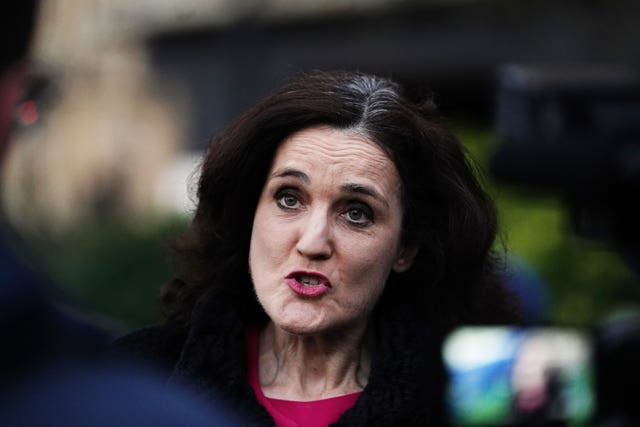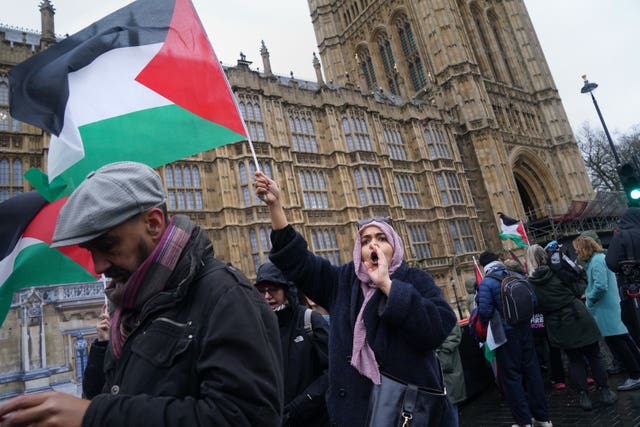Concerns raised over efforts to release hostages after Gaza ceasefire resolution
Foreign Office minister Andrew Mitchell sought to downplay concerns raised by Conservative colleagues in the Commons.

Conservative MPs fear a UK-backed United Nations resolution calling for a ceasefire in Gaza will “undermine” efforts to free hostages from Hamas control.
Foreign Office minister Andrew Mitchell attempted to downplay their concerns and detailed how the United Nations Security Council (UNSC) resolution sets out the demand for the “unconditional release of all hostages”.
But Conservative MP Matthew Offord (Hendon) said the resolution will “embolden” Hamas while former cabinet minister Theresa Villiers said her Chipping Barnet constituents “feel badly let down” by the votes at the UN.
Rishi Sunak said the UK was “pleased to support the resolution” because it was consistent with the UK position, “which is for an immediate sustained humanitarian pause, which would allow for the safe release of hostages, more aid into Gaza and provide a platform for a more lasting durable ceasefire”.
The UNSC resolution presses for a ceasefire in Gaza during the Muslim holy month of Ramadan and it is the first time the body has called for a halt to the fighting.
The resolution did not link the demand for the release of the hostages to the ceasefire during Ramadan, which runs until April 9.
Mr Mitchell, making a statement to the Commons, said: “We want to see an immediate sustained humanitarian pause which would allow for the safe release of hostages and more aid to reach Gaza, and that is what yesterday’s resolution called for, and that is why the United Kingdom voted yes on this text.
“And that is why the Government is now focused on seeing the resolution implemented as quickly as possible.”
Mr Mitchell said UK support was given because the resolution included the “unconditional release” of Israeli hostages, and it also called for combatants to “uphold international humanitarian law” and to scale up the delivery of aid.
The ongoing war in Gaza was sparked by Hamas’s deadly raid into Israel on October 7 that killed 1,200 people and saw militants seize about 250 hostages.

Mr Offord told the Commons: “The UN resolution has undermined efforts to secure the release of the hostages held by Hamas with a collapse in negotiations only today.
“Hamas has reiterated its hard-line positions that were previously criticised by the United Kingdom.
“Does (Mr Mitchell) share my concern that the resolution will not only embolden Hamas, which hopes to achieve a ceasefire without releasing the hostages, and enable it to maintain its grip on the people of Gaza?”
Mr Mitchell replied: “It certainly shouldn’t do that and if I may draw his attention to the explanation of the vote, which was published at the same time as Britain supported the resolution yesterday, we said ‘we regret this resolution has not condemned the terrorist attacks perpetrated by Hamas on October 7, the UK condemns these attacks unequivocally’.
“So I hope he will bear that in mind in reaching his conclusion about (resolution) 2728.”

“I just don’t understand how the minister and the Foreign Secretary can say that in policy terms nothing has changed when the UK has just voted for a resolution that doesn’t condemn the Hamas atrocity of October 7 and delinks a ceasefire with the release of hostages.
“As (Mr Offord) pointed out, doesn’t this make it less likely that the hostages will be released?”
Mr Mitchell replied: “I don’t agree with (Ms Villiers) and the resolution sets out the urgent demand for the unconditional release of all hostages and we welcome the ongoing diplomatic efforts by Egypt, Qatar and the United States to this end.”
Conservative MP Alicia Kearns, who chairs the Foreign Affairs Committee, said the UNSC will “face an existential crisis” if its resolution is not carried through into action.
Conservative former minister David Jones warned the humanitarian situation in Gaza is “dire”, adding: “In northern Gaza it’s estimated that some 70% of the population are suffering the most appalling food shortages, resorting to eating animal feed, bird seed, grass.”
The UK on Monday airdropped aid into Gaza for the first time, parachuting more than 10 tonnes of food supplies into the war-torn territory.
Mr Sunak agreed this was the least effective way of delivering aid, telling MPs on the Liaison Committee “we need many more trucks per day” than the fewer than 200 currently going in.
The Prime Minister said: “That’s not good enough. I’ve made that point repeatedly to prime minister Netanyahu as have our allies and we will continue to press for more land access.
“That is the best way to get more aid in quickly. But whilst that is not happening at the scale we would like it, I do think it is right to do extra aid via other corridors.”





